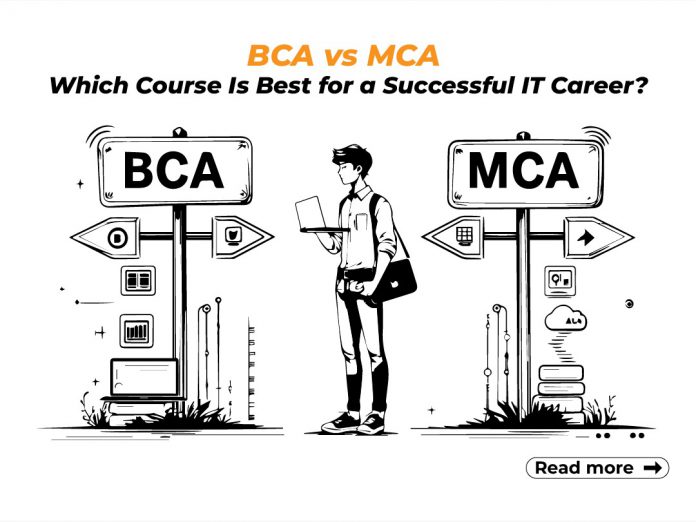The IT sector is growing incredibly, and the demand for skilled professionals shows no signs of slowing down. From software development to cybersecurity, opportunities are abundant for those with the right skill set. Starting early and specialising smartly for aspiring tech professionals can make all the difference. That’s where a strategic combination of BCA lateral entry and MCA can offer a career-defining edge.
If you have a diploma and want to join BCA directly in the second year, this blog is for you. MCA in data science or cybersecurity is a smart way to grow in IT.
Understanding BCA Lateral Entry
Bachelor of Computer Applications Lateral Entry is a flexible and time-saving option. This degree is for diploma holders in computer applications or related fields. Eligible students can join the programme directly in the second year. This makes it an ideal solution for those looking to learn quickly and work sooner.
BCA Lateral Entry Eligibility and Admission
To qualify for BCA lateral entry, candidates must have a diploma in computer applications, IT, or computer engineering. That, too from a recognised institute.
Most BCA lateral entry colleges in India require a minimum percentage (usually around 50%) in the diploma programme. Admission procedures vary across institutions, but they often involve merit-based selection or entrance exams.
Why Choose BCA Lateral Entry After Diploma?
Lateral entry in BCA after diploma saves both time and money. Instead of studying for six semesters, diploma holders complete their BCA in just four. This path gives students early access to industry-relevant knowledge. Top companies hire faster when candidates have early industry knowledge.
BCA lateral entry for diploma holders fills the gap between technical training and theoretical knowledge. It’s essential to career advancement.
Advantages of BCA Lateral Entry
- Reduced course duration
- Cost-effective education
- Quick entry into the job market
- Higher-level learning from the second year
- Access to internships and projects earlier
Exploring MCA
What is MCA and Who Should Pursue It?
Master of Computer Applications (MCA) is a post graduate programme. It aims at students who want to deepen their technical and managerial skills in IT. Ideal for graduates of BCA or other IT-related fields, the MCA curriculum emphasises application-oriented training. It serves as the perfect platform for those who want to lead software projects, engage in research, or move into specialised IT roles.
MCA in Data Science
The digital economy thrives on data. Businesses need professionals who can analyse large datasets, identify trends, and make data-driven decisions. That’s why MCA in data science is one of the most in-demand specialisations today.
MCA Data Science Syllabus Includes:
- Machine learning and AI
- Data technologies (Hadoop, Spark)
- Data mining
- Python and R programming
- Business analytics
Career Opportunities After MCA in Data Science:
- Data scientist
- AI engineer
- Business intelligence analyst
- Machine learning specialist
Top MCA data science colleges provide hands-on experience with tools like Tableau, Power BI, and cloud platforms, giving graduates a competitive edge in the job market.
MCA in Cyber Security
As digital threats become more sophisticated, the need for trained cybersecurity professionals has grown dramatically. MCA in cyber security trains students to safeguard networks, prevent data breaches, and respond to cyber incidents effectively.
Core Areas Covered in MCA Cyber Security:
- Ethical hacking
- Cryptography
- Network security
- Digital forensics
- Cyber law and compliance
Career Roles in Cyber Security Include:
- Ethical hacker
- Security analyst
- Information security manager
- Cyber forensic expert
MCA cyber security colleges in India often collaborate with industry leaders to provide practical training and certifications from global security organisations.
BCA Lateral Entry vs. MCA: Which Path to Choose?
BCA lateral entry is best suited for diploma holders seeking a strong foundation in computer applications with a faster graduation timeline. On the other hand, MCA specialisations are ideal for graduates ready to dive deep into niche areas of the IT industry.
A good career in IT can begin with BCA lateral entry after diploma and become even more lucrative with an MCA in data science or cyber security. This combination ensures both breadth and depth of knowledge, increasing your versatility and value in the tech world.
Career Opportunities After BCA and MCA
Graduates of BCA and MCA programmes are hired across industries, including software, finance, healthcare, e-commerce, education, and government. Some common roles include:
After BCA (Lateral Entry):
- Web developer
- Software tester
- System analyst
- Junior programmer
- Technical support specialist
After MCA in Data Science or Cyber Security:
- Data engineer
- Cloud architect
- Cybersecurity consultant
- AI developer
- Risk analyst
Salary Expectations:
Entry-level roles after BCA can offer salaries ranging from ₹3 to ₹6 LPA. This depends on the location and organisation. Post-MCA, salaries typically start from ₹6 LPA and can rise to ₹15+ LPA. This is for specialised roles in data science and cybersecurity.
Future Trends in IT Careers
Cloud Computing and AI
Cloud platforms like AWS, Azure, and Google Cloud are becoming the backbone of IT infrastructure. Coupled with AI, these technologies drive automation, reduce operation costs, and optimise performance.
Blockchain & Fintech
Industries are leveraging blockchain for secure transactions, transparent contracts, and fraud prevention. Professionals with blockchain knowledge are in high demand, especially in finance, healthcare, and the supply chain.
Edge Computing & IoT
Now, devices generate data at lightning speed. Edge computing ensures real-time processing close to the source. The Internet of Things (IoT) continues to open new career avenues in automation and smart tech.
Why MCA Specialisations Give an Edge:
Specialised MCA degrees offer in-depth training in trending domains. Whether it’s machine learning algorithms or incident response techniques in cybersecurity, these programmes ensure hands-on experience with real-world tools. This makes candidates job-ready and attractive to recruiters.
Conclusion
Fast-tracking a career in IT requires smart decisions at the right time. BCA lateral entry provides diploma holders a valuable opportunity to gain a full degree in less time, while MCA specialisations like data science and cybersecurity prepare graduates for high-paying, future-proof roles. Together, they form a powerful career roadmap.
When selecting between BCA lateral entry and MCA programmes, evaluate your current qualifications, interests, and long-term goals. If you’re starting out after a diploma, lateral entry in BCA is an efficient gateway. If you’re ready to specialise, MCA in data science or cyber security opens doors to leadership roles in tomorrow’s tech landscape.
The IT world rewards those who adapt, learn, and specialise. With the right course and college, your dream career in IT is not just possible – it’s inevitable.




![Career Paths After B.Sc. Information Technology [Lateral Entry] Career Paths after B.Sc. Information Technology [Lateral Entry]](https://www.lpu.in/blog/wp-content/uploads/2026/01/Career-Paths-after-B.Sc_.-Information-Technology-Lateral-Entry-218x150.png)









